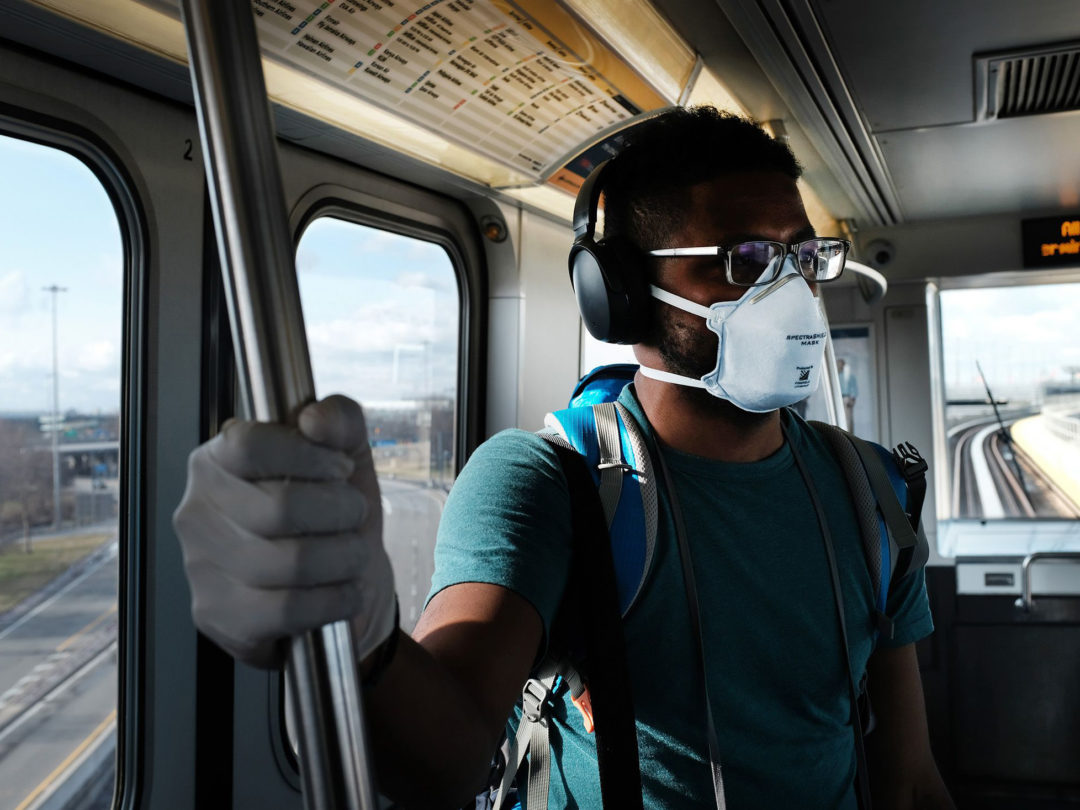
Visit Our Sponsors |
|
|
|
|
|
|
|
|
|
|
|
|
|
|
|
|
|
|
|
|
|
|
|
|
|
|
|
|
|
|
|
|
|
|
|
|
|
|
|
|
|
|
|
|
|
|
|
|
|
|
|
|
|
|
|
|
|
|
|
|
|
|
|
|
|
|

The coronavirus pandemic showed off one the U.S. economy’s best traits — its diverse and nimble small-business sector.
As social-distancing measures to slow COVID-19 crushed their sales, firms across the country pivoted for survival. Here are the stories of five companies that turned to making personal protective equipment, otherwise known as PPE, amid nationwide shortages and what those new businesses lines look like now.
Rebel Designs
Location: Brooklyn, New York
Employees: 7
PPE item: Masks
Gina Riley started her jewelry and accessories company, Rebel Designs, almost 20 years ago from her Brooklyn apartment, where she’d craft each piece by hand. This spring, she had about half a dozen employees and a robust order book. But the pandemic upended her small business, forcing it to suspend operations.
When the company reopened in June, Riley faced a new reality. Would shoppers be in the mood to splurge on $750 shoulder bags or an $80 ring? She didn’t know either, so she plowed into the booming market for PPE and started making non-medical cloth masks for consumers ($19 apiece coming in styles like white-navy flame). And thanks to a local initiative, they are being sold at retail chain West Elm.
“As a small business, we don’t have those nest eggs,” Riley said. “We’re working and spending and working and spending.” She realized: “We have to make masks — this is clearly a necessity.”
Selling masks, and a Paycheck Protection Program loan from the federal government, have helped the company stay afloat. Even though demand has waned, Riley said the company plans to keep making face coverings, especially with cases expected to pick up this winter.
At this point, “it’s just another accessory,” Riley said. “It’s our new normal.”
Flowfold
Location: Gorham, Maine
Employees: 40
PPE item: Face shields
Like so many entrepreneurs, Devin McNeill and Charles Friedman started their company, Flowfold, amid frustration. After an old wallet fell apart, Friedman made one from materials used in boat sails that made it lighter and more durable. After college, they incorporated on a small island near Portland, Maine, in 2010 and sold to local stores. The company sputtered along until 2015 when L.L. Bean become a customer. It’s since added tote bags, duffel bags and even dog leashes.
“We’re a modestly successful company, and then Covid hits,” said McNeill, 32.
With sales tumbling, the eight-person firm shifted cutting equipment used for wallets and bags to making face shields for local hospitals. In April, the U.S. Centers for Disease Control ordered 500,000 units. That kind of demand, along with a $74,000 PPP loan, pushed the company to expand its workforce to 40.
Initially, Flowfold expected to make face shields for a month, but it’s become a sustainable business and now churns out 50,000 face shields per week. The bulk of sales migrated to consumers, via its website, from hospital and other large institutions. Since the school year started, a kids version has taken off and now makes up half of orders.
“People now have face shields for their everyday life,” McNeill said.
When demand for face shields does wane, the company can shift other products to those machines. Overall, the pivot to PPE has made Flowfold a more nimble company and introduced the brand to a slew of new customers, according to McNeill.
“Before, we could release four to six products a year, but right now we have the capacity where we could do 10 to 12,” McNeill said. “We’re very excited about that.”
Dimo’s Pizza
Location: Chicago
Employees: 50
PPE item: Face shields
As the pandemic hit the U.S. in March, Dimitri Syrkin-Nikolau saw sales tank at the two Dimo’s Pizza shops he owns in Chicago. The 35-year-old needed to pivot — and quickly — to save four dozen jobs.
Many restaurants turned to selling groceries or more booze. Syrkin-Nikolau looked at his pizza ovens and thought about plastics and how people were struggling to get enough PPE. In short order, Dimo’s repurposed the ovens for molding acrylic and started producing 1,000 face shields per week. The company charged just $5, which returned enough profit to help Syrkin-Nikolau retain his entire staff. The company also received a PPP loan to make ends meet.
About six months later, demand for face shields has declined, with Dimo’s selling less than 100 per week. Meanwhile, the pizza business is back to about 60% of what it was pre-coronavirus. Syrkin-Nikolau looks back at how his company shifted gears with pride, and a little regret.
“You want to believe that what you are gonna do is going to make a difference,” Syrkin-Nikolau said. “I feel somewhat overshadowed by the fact that the U.S. still leads the world in number of cases and deaths.”
Cadillac Products Automotive
Location: Troy, Michigan
Employees: 225
PPE item: Medical gowns
Don Lowe joined Cadillac Products Automotive late last year to look for new growth opportunities. The family-run company founded in 1942 had survived all those years by being a cog in the Detroit supply chain (it uses polyethylene film to make sound, liquid and heat barriers for vehicles).
“We were well on our way to picking up some new business, and then the virus hit and no one was at work,” said Lowe, 63.
At the same time, a member of the founding family who worked as a nurse asked if the company could make a protective smock for hospital workers battling Covid. Turns out that polyethylene film can be used to make plastic bags, and within days, the company designed a disposable medical gown. The initial production run, which volunteers helped produce, made 50,000 garments that were donated to local hospitals, nursing homes, police and fire houses.
After that, the firm realized there was a burgeoning market for the gowns made in the U.S. and the company shifted to making them for sale under a new brand name. It’s since sold almost half a million units, which, along with a PPP loan, helped the firm stay afloat and add 15 employees. The company is also investing in new machinery, partially subsidized by local government, to reduce costs and speed up production times.
Even with the auto industry bouncing back, the company plans to keep pushing on their new growth business.
“For us, we see it as a natural fit because we already make the film,” Lowe said. “We just found a new use.”
Global Cannabinoids
Location: Las Vegas
Employees: 40
PPE item: Hand sanitizer
As the coronavirus spread in other parts of the world, Ryan Lewis saw web searches for hand sanitizer in the U.S. spike.
The company the 41-year-old founded, Global Cannabinoids, made products, like lotions and beverages, infused with cannabidiol (which is derived from hemp and often referred to as CBD) for the U.S. wholesale market. But it didn't have a hand sanitizer, so it made one with CBD. In just a couple hours, 250,000 units sold out.
Then Covid hit the U.S. and customers began asking for non-CBD sanitizer. The firm quickly obliged and sales surged. Shortages caused by slow imports from China brought more demand. The company was well positioned to pivot because it had a reliable supply of ethanol alcohol, which is a key ingredient in making CBD products and hand sanitizer.
This new business helped offset a sharp decline in CBD sales and saved jobs, but it was short lived. Sales trailed off in July after supply from China increased, Lewis said. But concerns about the quality of imported sanitizer has pushed governments and other entities to buy American-made. And that’s been a boon for Lewis, who has signed deals with large school districts and expects demand to increase as more of the economy reopens.
“Long term, it’s a good, sustainable business,” Lewis said.
RELATED CONTENT
RELATED VIDEOS
Timely, incisive articles delivered directly to your inbox.






